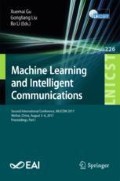Abstract
Downlink multi-user shared access (MUSA) is a non-orthogonal multiple access scheme (NOMA) based on the traditional power domain superposition and uses a mirror constellation to optimize the modulated symbol mapping of the paired users. In this paper, bit error ratio (BER) performance of MUSA with successive interference cancellation (SIC) is investigated in a cellular downlink scenario over Rayleigh fading channel. Firstly, we elaborate downlink MUSA system based on NOMA and spreading sequences in detail. Then, we compare the BER performance of MUSA with pure NOMA under different power allocation schemes. On this basis, we further study the system average BER performance in downlink MUSA and NOMA with respect to the power difference of the users, respectively. In addition, BER performance of MUSA with different spreading sequences is evaluated. Finally, the simulation results show that MUSA with appropriate spreading sequences is able to obtain better BER performance than NOMA under the same simulation conditions, and a reasonable power allocation is the key to improve BER performance of MUSA and NOMA.
Access this chapter
Tax calculation will be finalised at checkout
Purchases are for personal use only
References
Yan, C., Kang, G., Zhang, N.: A dimension distance-based SCMA codebook design. IEEE Access 5, 5471–5479 (2017)
Chen, S., Ren, B., Gao, Q., Kang, S., Sun, S., Niu, K.: Pattern division multiple access-a novel nonorthogonal multiple access for 5th-generation radio networks. IEEE Trans. Veh. Technol. 66(4), 3185–3196 (2017)
Ding, Z., Yang, Z., Fan, P., Poor, H.V.: On the performance of non-orthogonal multiple access in 5G systems with randomly deployed users. IEEE Sig. Process. Lett. 21(12), 1501–1505 (2014)
Men, J., Ge, J., Zhang, C.: Performance analysis of nonorthogonal multiple access for relaying networks over Nakagami-m fading channels. IEEE Trans. Veh. Technol. 66(2), 1200–1208 (2017)
Benjebbour, A., Saito, K., Li, A., Kishiyama, Y., Nakamura, T.: Nonorthogonal multiple access (NOMA): concept, performance evaluation and experimental trials. In: 10th IEEE International Conference on Wireless Networks and Mobile Communications, pp. 1–6. IEEE Press, Morocco (2015)
Otao, N., Kishiyama, Y., Higuchi, K.: Performance of non-orthogonal access with SIC in cellular downlink using proportional fair-based resource allocation. In: 9th IEEE International Symposium on Wireless Communication Systems, pp. 476–480. IEEE Press, Paris (2012)
Usman, M.R., Khan, A., Usman, M.A., Seong, J.Y., Shin, S.Y.: Performance of perfect and imperfect SIC in downlink non orthogonal multiple access (NOMA). In: 2016 IEEE International Conference on Smart Green Technology in Electrical and Information Systems, pp. 102–106. IEEE Press, Bali (2016)
Zhang, J., Wang, X., Tsuyoshi, H., Tokuro, K.: Downlink non-orthogonal multiple access (NOMA) constellation rotation. In: IEEE 84th Vehicular Technology Conference, pp. 1–5. IEEE Press, Montreal (2016)
Mohammed, A., Pei, X., Mohammed, A.I., Rahim, T.: Uplink non-orthogonal multiple access for 5G wireless networks. In: 11th IEEE International Symposium on Wireless Communication Systems, pp. 781–785. IEEE Press, Barcelona (2014)
Pongsatorn, S., Tatcha, C.: Uplink spectral efficiency for non-orthogonal multiple access in Rayleigh Fading. In: 18th IEEE International Conference on Advanced Communication Technology, pp. 751–754. IEEE Press, Pyeongchang (2016)
Zhang, N., Wang, J., Kang, G., Liu, Y.: Uplink nonorthogonal multiple access in 5G systems. IEEE Commun. Lett. 20(3), 458–461 (2016)
Yuan, Z., Yu, G., Li, W., Yuan, Y., Wang, X., Xu, J.: Multi-user shared access for internet of things. In: IEEE 83rd Vehicular Technology Conference, pp. 1–5. IEEE Press, Nanjing (2016)
Yuan, Y., Yuan, Z., Yu, G., Hwang, C., Liao, P., Li, A., Takeda, K.: Non-orthogonal transmission technology in LTE evolution. IEEE Commun. Mag. 54(7), 68–74 (2016)
Acknowledgement
This work is supported in part by National Natural Science Foundation of China (No. 61671184, No. 61401120, No. 61371100) and National Science and Technology Major Project of China (No. 2015ZX03001041).
Author information
Authors and Affiliations
Corresponding author
Editor information
Editors and Affiliations
Rights and permissions
Copyright information
© 2018 ICST Institute for Computer Sciences, Social Informatics and Telecommunications Engineering
About this paper
Cite this paper
Xu, Y., Wang, G., Zheng, L., Liu, R., Zhao, D. (2018). BER Performance Evaluation of Downlink MUSA over Rayleigh Fading Channel. In: Gu, X., Liu, G., Li, B. (eds) Machine Learning and Intelligent Communications. MLICOM 2017. Lecture Notes of the Institute for Computer Sciences, Social Informatics and Telecommunications Engineering, vol 226. Springer, Cham. https://doi.org/10.1007/978-3-319-73564-1_9
Download citation
DOI: https://doi.org/10.1007/978-3-319-73564-1_9
Published:
Publisher Name: Springer, Cham
Print ISBN: 978-3-319-73563-4
Online ISBN: 978-3-319-73564-1
eBook Packages: Computer ScienceComputer Science (R0)

